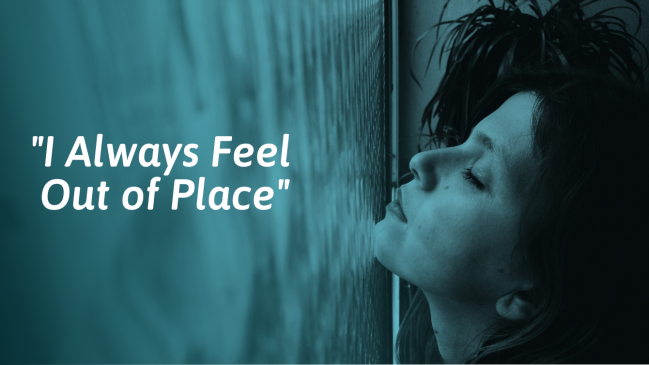“I feel like I don’t fit in anywhere in this world. I don’t have a group of friends, and I don’t fit in at work. I have nothing in common with my family, either. It feels like there’s no place in society for me.”
It’s tough to feel like you don’t fit in. Belonging is one of our basic needs.
We all go through periods of feeling lonely or like we don’t fit in. Sometimes, it’s just a feeling or a short-term problem. Other times, though, there is a deeper issue that needs sorting out.
We’re told to be ourselves, but that’s not always simple. And what happens when we try to be ourselves, but we don’t find anyone else that we seem to connect to?
Why don’t I fit in?
Depression and anxiety can make someone feel like they don’t fit in. You may be an introvert who doesn’t enjoy being in groups. Or you may believe that there is something wrong with you and feel safer when you distance yourself from others.
How do I find where I belong?
The best way to find where you belong is to get to know yourself. What interests you? Find the courage to try new things and go to new places by yourself. Doing different things opens you up to talking to people you may never have met otherwise.
Sections
What to do if you don’t fit in
1. Consider how you see yourself
When you feel like an outsider, the feeling might or might not be based on facts.
For example, if you’ve just started a new job and don’t know any of your colleagues, then you are (for now) an outsider. It can help to remind yourself that this kind of situation is temporary and that most people feel like they don’t fit in at some point in their lives.
But other times, it feels like we never fit in however much we try. This might be because you are making social mistakes, but it could also come down to how you see yourself. Your feelings of “not fitting in” may be coming from a place of self-judgment.
For example, if you think you are “weird” or “strange,” you may always feel like you don’t fit in. If this sounds familiar, see our article on what to do if you don’t like your personality.
2. Don’t pretend to be someone else
Sometimes, we have to adapt to certain situations or environments. For example, we’ll talk in a more polite way around our parents or boss. But if you try to change or hide the core of who you are, you’ll continue to struggle. Even if you succeed in getting friends in this way, you’ll still feel like you don’t fit in because you’re not showing your true self.
3. Use friendly body language
Body language plays a big part in how others perceive us. When we’re nervous, we may tense our body, cross our arms, and have a serious expression on our face.
When talking to others, notice how you’re holding your body. Try to relax your jaw and forehead. We have more tips on how to look friendly and approachable.
4. Learn how to open up
Part of fitting in with others is sharing about ourselves. Being a good listener is important, but most people look for balanced relationships. We feel more comfortable sharing with others when they share with us, as well. Opening up to others is scary, but it will make your relationships more rewarding.
It can be difficult to know how much to share at what point in the relationship. We have an in-depth article on how to open up to people.
5. Overcome trust issues
To fit in with people, we have to give them a certain level of trust. Trusting others can be scary, especially if you’ve been hurt before. However, trust is something we can learn to develop and nurture.
Read more in our guide to building trust in relationships.
6. Ask questions
Show interest in others by asking them questions. People like talking about themselves, as long as you appear to be asking out of genuine interest instead of coming from a place of judgment.
Make sure that the questions you ask are relevant to what they are talking about and aren’t too personal. You can build up to more personal questions later.
For example, if someone mentions that they recently went through a break-up, try asking how long they were together instead of the reason for the break-up. They will share more personal information if and when they are ready.
7. Try to find common ground
People tend to like people who are similar to them. If you’re someone who feels you don’t fit in, this can make you feel like no one will like you. But the truth is, we can usually find something in common with the person we’re talking to, even if it’s just a love of Korean noodle cups.
Try playing a little game where you assume you have something in common with every person you meet. Your goal is to find out what that similarity is.
For more help on this topic, check out our guide on how to get along with others. You can find ideas of interesting things to talk about to practice finding common ground.
8. Get help if you’re anxious or depressed
Depression and anxiety can be a barrier to connecting with other people. They can make you believe that you’re not worthy of other people’s attention.
You can work on these issues with a therapist or coach, who will help you pinpoint your problems and find solutions tailored to your specific situation. Self-help books, online courses, and support groups may also be helpful. We also have a guide on how to make friends when you’re depressed.
Working on framing your problem in a more specific way can help you overcome it. For example, “I need to work on my feelings of self-worth” or working to overcome your feelings of feeling judged are more manageable problems than “I just don’t fit in.”
9. Don’t tease or make fun of people
You may see people teasing each other and want to participate. Once we’re close to someone and feel safe with them, teasing and bantering can be a fun activity that solidifies the relationship. However, when you’re trying to fit in, don’t tease others until you can be relatively sure how they will take it.
Not fitting in at work
Understand workplace expectations
To fit in at work, you need to understand your workplace’s social rules and norms. Your workplace may be a formal place that expects people to keep their personal life private. On the other hand, in some workplaces, you will find the boss talking about video games with employees over lunch.
Try to observe how other people act at work. Do they use humor when they talk to each other, or are they mainly formal? Do your colleagues ask each other about their family and hobbies, or are the conversations centered on work? Is it OK to walk up to people’s desks and ask a question, or are you expected to communicate via email?
Some people act very differently socially and professionally, while others act in the same way in and outside of work. Understanding how people are at your place of work is the first step to fitting in.
If your workplace is formal, making an effort to dress nicer may help you fit in. If your workplace is more casual, adopting a similar attitude can help. Remember, you’re not trying to be someone you’re not, you’re just showing different parts of yourself.
Be honest
Don’t lie about your skills, work experience, or background to fit in or impress your coworkers. It will backfire if someone finds out.
Don’t share too much
Avoid oversharing at work. For example, if someone asks you about your family, you don’t need to say, “I’ve cut contact with my father because he’s an alcoholic.” Instead, try something like, “I’m not close to my family.”
Similarly, don’t ask your coworkers too many personal questions. For example, don’t ask a coworker about their divorce unless they start the conversation. Respect your coworker’s privacy and let a friendship develop naturally. Some people prefer to keep their work and personal lives separate. Don’t take it personally if they don’t open up.
Don’t bring up explosive topics
It’s usually best to keep political and moral discussions to existing friendships outside the workplace. Try not to bring up sensitive topics that people might have strong views about. If someone says something that you disagree with, ask yourself if it is worth arguing over before commenting.
If you need help with this, read our guide on how to be more agreeable.
Have meals with colleagues
One of the best ways to bond is over a food or coffee break. It can be intimidating to join someone for lunch in the beginning, but give it a try. Do people go out to eat together? Ask if you can join in.
Not fitting in at school
Try to find like-minded people
One common problem in many social settings and particularly in high school is that we tend only to notice extroverted and popular people. We may try hard to fit in with them but struggle to know how to do that. In the process, we may miss other interesting, kind people we may get along with quite well.
To find like-minded people, look around. Try to notice something about everyone in your class. Is there a classmate you often find doodling that you could talk to about art? Perhaps you share a similar taste in music with the classmate who walks around wearing headphones. Take a chance on the shy kid who sits off to the side.
Join groups for things that you’re interested in, or consider starting one. Read our guide on finding like-minded people for more tips.
Try new things
Say you hear classmates talking about meeting to play basketball. “I don’t play basketball,” you think. When they talk about Dungeons and Dragons, you say, “I don’t know how to do that.” When you’re at a party, you sit to the side and watch others dance. You don’t try watching the new TV show everyone is talking about because you assume you won’t like it.
No one is born knowing what they are good at or what they like. We find these things out through experimentation. Engaging in the things others are engaging in will help you feel like you fit in with them because you share an experience together.
Of course, if you already know without a doubt that you hate yoga, don’t try to force yourself only to fit in with others. But if there is something you are unsure about, give it a shot. You may surprise yourself. Even if you end up disliking it, at least now you know from experience.
Cultivate different groups of friends
You may have an image in your head of what friendship should look like. You may dream of having a best friend that you do everything with.
That works for some people, but others have several people they do different things with. Some friends may like to play video games together but need to study alone. You can find other friends to study with, but they may not have the same hobbies as you.
Accept your differences
You may believe that in order to fit in, you need to be similar to others. You need to like the same TV shows, have the same hobbies, the same taste in clothes, and similar religious or political views.
The truth is, it’s very rare to find someone you will be completely similar to. You can be very close friends with someone even if you have opposing views or if you don’t have an opinion on something they’re passionate about.
For example, if someone asks you, “What’s your favorite band?,” it’s OK to say that you don’t have one, even if they think it’s strange. You don’t need to have an opinion about everything. Or maybe there’s a trend everyone is into. It’s OK not to like it. Just try to express your opinion respectfully, without being critical of others. Neither of you is right or wrong. You’re just different.
Not fitting in with family
Feeling like you don’t belong in your family can be challenging, especially when it feels like everyone else is getting along and you are the black sheep.
You may be carrying childhood hurt and resentment that gets in the way of feeling comfortable around your parents, siblings, or extended family. Perhaps you remember the ways they hurt you when you were young and find it difficult to get over these experiences. You may find that even now, your family can be critical or disrespect your boundaries without them even noticing. Or the problem might just be the fact that you’re different from them.
Be curious about their interests and beliefs
Perhaps you have different views about religion or culture. Or maybe you enjoy spending your time in very different ways.
Instead of telling your family that they’re wrong for their beliefs, try to understand why they feel the way they do. Ask them about their jobs or hobbies, even if it’s not something you’re typically interested in.
Remember that it’s very common for different generations to have conflicting beliefs. And while some children adopt the views of their parents, others do not.
Share noncontroversial things about your life
Sadly, sometimes our family won’t be able to meet us at the emotional level we need. There may be several topics we find we can’t talk about without getting judgemental comments.
The solution may be to find “safe” topics you can talk to your family about. That way, it feels like you’re sharing without giving away too much.
Safe topics can include practical information about your hobbies or day-to-day life. (For example, “My tomatoes seem to be growing really well. I’m not sure why the cucumbers aren’t.”) You can think of some topics you can discuss with them in advance before you meet up.
Suggest doing an activity together
Sometimes it can be hard to hold a conversation with family members. In many cases, doing something together can help you feel closer and give you something to talk about when there are gaps in the conversation. Is there something that your family would be open to trying together? For example, you could suggest hiking, cooking, board games, or watching a movie.
Not fitting in with groups
It’s normal to feel out of place when you’re in a group of people who know each other quite well. Here are some tips:
Smile and make eye contact
When someone is talking, smiling and nodding sends them a signal that we are listening and that we accept them. You appear as a friendly person who is nice to be around, even if you aren’t contributing much to the discussion.
For more, read our in-depth guide on how to make eye contact.
Practice group conversations
Talking to people in a group is different than talking one-on-one. When speaking in a group, it’s best not to try to dominate the conversation but know when and how to speak up. Read our in-depth guide on joining group conversations.
Match your energy to the group
Try to notice the groups’ energy level—not just what they’re saying, but how they’re saying it. Sometimes, you may need to raise your energy level to fit a group if they are lively and joking around. Other times, the group will be having a serious discussion, and making jokes may not be appropriate.






I don’t like this article. After reading it, it kind of seems to me like it’s trying to say that you should be the person that other people. This article doesn’t seem genuine like I thought it did.
Im an outsider, im not fitting in anywhere…
And im doing everything right according to this article, nothing helps….
Thanks alot